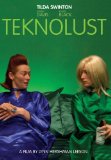| Reviews & Columns |
|
Reviews DVD TV on DVD Blu-ray 4K UHD International DVDs In Theaters Reviews by Studio Video Games Features Collector Series DVDs Easter Egg Database Interviews DVD Talk Radio Feature Articles Columns Anime Talk DVD Savant Horror DVDs The M.O.D. Squad Art House HD Talk Silent DVD
|
DVD Talk Forum |
|
|
| Resources |
|
DVD Price Search Customer Service #'s RCE Info Links |
|
Columns
|
|
|
Teknolust
Tilda Swinton plays a quadruple role as a scientist named Rosetta Stone and her three cloned test subjects, Ruby, Olive, and Marine. Apparently, the three clones are partially robotic, although which parts and why are not well-defined, as are Rosetta Stone's goals for the clone-bots, which require sperm to survive. That's right, every week, Ruby goes out and locates an average schmoe specimen at a club or bar, extracts a sample, through the usual means, snaps a photo, and disappears. It's all going fairly routinely (I guess), with Rosetta checking the progress on her microwave/TV screen (??), projecting old, romantic film clips to motivate Ruby, and generally studying their demeanor, until it turns out all the men targeted by the experiments have gone sterile.
I'm sure there's a genius metaphor or two in there for the right kind of audience member to latch onto, but sadly, despite her immense talents, Swinton can't make any of her four characters all that interesting. Rosetta is a meek, mousy scientist with little to no discernable personality and hazy goals, and the other three, being part robot, are naturally restricted from having much personality. Ruby, in partiuclar, moves and acts with a distinct robotic stiffness that flattens the actress' charisma. The appearance of Sandy, a crappy Kinko's employee played by Jeremy Davies (oh, look, another metaphor!) and the nerdy-cool James Urbaniak as an FBI agent is meant to bring both characters out of their shell, but Rosetta's transformation moves like molasses, and Sandy's oddball presence is more uncomfortable than relieving.
Perhaps I missed it as I tried to unravel the movie's numerous messages, but the IMDb synopsis for the film is far more informative than the film itself. Apparently the world no longer looks at sex as a means to reproduce, which gives weight to Ruby's trysts and what they mean to a de-sexualized society. The way in which Ruby and her clone-bot sisters interact with people through the internet is also not very well defined, thanks to the inclusion of that microwave as some sort of techno-phone Rosetta uses to communicate with the trio. Then, there are just throwaway gags, such as when one of the trio apparently destroys the stock market with a Wiimote as a joke. What anyone is supposed to make of these things, much less the film as a whole, is very hard to guess.
Then again, maybe it doesn't mean anything. In the last few minutes of the film, Leeson arrives at a simple conclusion -- in fact, it's so simple, it's almost embarrassing, given the amount of metaphor and symbolism that led up to it. Could Teknolust be little more than the most bizarre, heavy-handed romantic comedy ever made? I'd like to give Leeson and Swinton more credit than that, but Teknolust is an idea in search of a vision that will pull it together into a coherent, quality piece of filmmaking.
The DVD
Teknolust comes with a clean package design, although it did make me wonder if the entire movie was going to take place on a single stage, with just the three Tildas interacting (a lone photo of Leeson at her desk stands out as not being part of the film itself).
The Video and Audio
Presented in 1.78:1 anamorphic widescreen and Dolby Digital 2.0, Teknolust's low-budget roots are pretty evident. Colors are relatively bright, but there are all sorts of minor video issues like mosquito noise, color banding, occasional artifacting, and a general lack of fine detail. Similarly, the audio is limited in scope but generally gets the job done, lacking the polish that other films might've offered but still conveying the proper information. Unfortunately, the disc contains no subtitles or captions of any kind.
The Extras
"Dina" (4:52) is a short piece on an artificial intelligence piece created by Leeson. At first, I wasn't sure if the clip was a short film parading as a documentary or an actual documentary, but ultimately it seems to be the latter. A post-screening Q&A (34:56) with Leeson and Tilda Swinton is slightly more enlightening, although despite each of her breathlessly wordy, slightly hyperbolic lead-ins, the host still ends up asking questions like "where do you get your ideas" and "how did you two meet?"
The film's original theatrical trailer is also included.
Conclusion
Leeson has made other films, at least one of which she even claims are part of a series in the DVD's major extra. Maybe if you've seen the others or know her work from elsewhere, Teknolust might be interesting as a piece of her output as an artist, but as a film, it's a confusion, murky inkblot of ideas and metaphors without anything for the viewer to latch onto. Skip it.
Please check out my other DVDTalk DVD, Blu-ray and theatrical reviews and/or follow me on Twitter.
|
| Popular Reviews |
| Sponsored Links |
|
|
| Sponsored Links |
|
|
| Release List | Reviews | Shop | Newsletter | Forum | DVD Giveaways | Blu-Ray | Advertise |
|
Copyright 2024 DVDTalk.com All Rights Reserved. Legal Info, Privacy Policy, Terms of Use,
Manage Preferences,
Your Privacy Choices | |||||||













